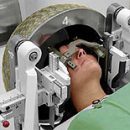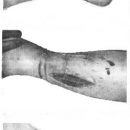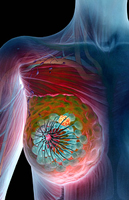Depending on the stomach cancer stage, there are various treatment methods. The choice of the treatment method depends on many factors. Of course, the location and stage of the tumor are important factors. Other factors include age, general condition and personal wishes.
Content
Treatment of stomach cancer
The main methods for the treatment of gastric cancer are: operation, chemotherapy and irradiation. Often the best approach to treatment can be the use of two or more methods. The main goal of treatment is the complete disposal of the disease. In the event that complete cure is impossible, therapy is aimed at facilitating the symptoms of the disease, such as disruption of food intake, pain or bleeding. Before starting treatment, it is important to clarify the purpose of the intended therapy.
Operational treatment of gastric cancer
Depending on the type of cancer of the stomach and the stage of the disease, an operation can be performed with a tumor removal along with a part of the stomach. If possible, the surgeon leaves an unaffected part of the stomach.
Currently, the operation is the only way to cure a gastric cancer. If there are 0, I, II or III stages of the stomach cancer, as well as relative to a satisfactory condition, an attempt is made to complete the tumor removal.
Even if cancer at the time of treatment is distributed and cannot be completely removed, the operation can help prevent bleeding from a tumor or contribute to the passage of food through the intestine. This type of surgery is called palliative, t.E. Performed in order to relieve or prevent symptoms, and not in order to cure cancer.
Chemotherapy in the treatment of gastric cancer

Under chemotherapy implies the use of antitumor drugs for the destruction of tumor cells. Typically, drugs are prescribed intravenously or inside, t.E. Through Roth. As soon as the drug enters the bloodstream, it spreads throughout the body. Chemotherapy is usually applied to the impact on the common tumor.
Chemotherapy can be the main method of treatment of gastric cancer, when the tumor has already spread to remote organs. This method of therapy is applied before or after surgery. Experience has shown that chemotherapy can ease the symptoms in some patients with stomach cancer, especially when cancer has spread to other areas of the body. There is an indication that chemotherapy in combination with radiation therapy may delay the recurrence (refund) of the disease and extend the life of patients with a common process.
Chemotherapeutic preparations not only destroy tumor cells, but can also damage normal cells, which leads to side effects. These side effects depend on the type of preparations, their doses and the duration of treatment.
The following complications of treatment may appear in the chemotherapy process:
- Increased fatigue
- Nausea and vomiting
- Liquid chair
- Loss of appetite
- Baldness (hair grow again after the end of treatment)
- Ulcers in the mouth
- Increased risk of infectious diseases due to a decrease in the number of leukocytes (white blood taurus)
- The appearance of bruises or bleeding.
- Dyspnea
Most of these side effects are held after the end of treatment. If such phenomena appears, report this to a doctor or a medical sister, as there are ways to combat side effects of chemotherapy.
Radiation therapy in the treatment of gastric cancer
In this method, the rays of high energies are used to destroy or reduce the tumor. Exposure can be outer or using radioactive materials administered directly to tumor tissue (internal or implantation). In the gastric cancer, outdoor irradiation is usually applied.
After the operation, radiation therapy can be used to destroy small foci of the tumor, which cannot be seen or removed during operational intervention. It is believed that radiation therapy, especially in combination with chemotherapy, can delay or prevent recurrence (refund) of cancer after surgery and can contribute to the extension of the patient's life. Radiation therapy can be used to facilitate symptoms, such as pain, bleeding and the difficulty of passing food.
The radiation therapy of the stomach cancer is a complex procedure, so it needs to be carried out in departments with extensive experience in the treatment of such patients.
From side effects of radiation therapy It is necessary to note minor skin reactions, nausea, vomiting, liquid chair or increased fatigue. These symptoms usually pass a few weeks after the cessation of treatment. Irradiation can aggravate the side effects of chemotherapy. If such phenomena appears, report them to a doctor who knows how to help you.
Survival of patients with stomach cancer depending on the stage of the disease
5-year survival means the percentage of patients who lived at least 5 years after the detection of cancer. Of course, patients can live significantly more after diagnosis. The overall survival of patients with cancer of the stomach fluctuates within 20%. One of the most important reasons for such a low survival is the detection of cancer in common stages. The survival rate is worse when the tumor is located in the upper sections of the stomach and better when it is localized in the lower departments. Patients receiving treatment at present may have a more favorable outcome.
While the above figures reflect the common picture, it must be remembered that the situations in each individual case are special and statistics cannot accurately predict what will happen with each patient. Ask your doctor about your chances of recovery and about the possibility of long survival. Doctors better know about your situation.









